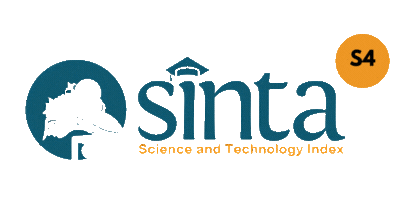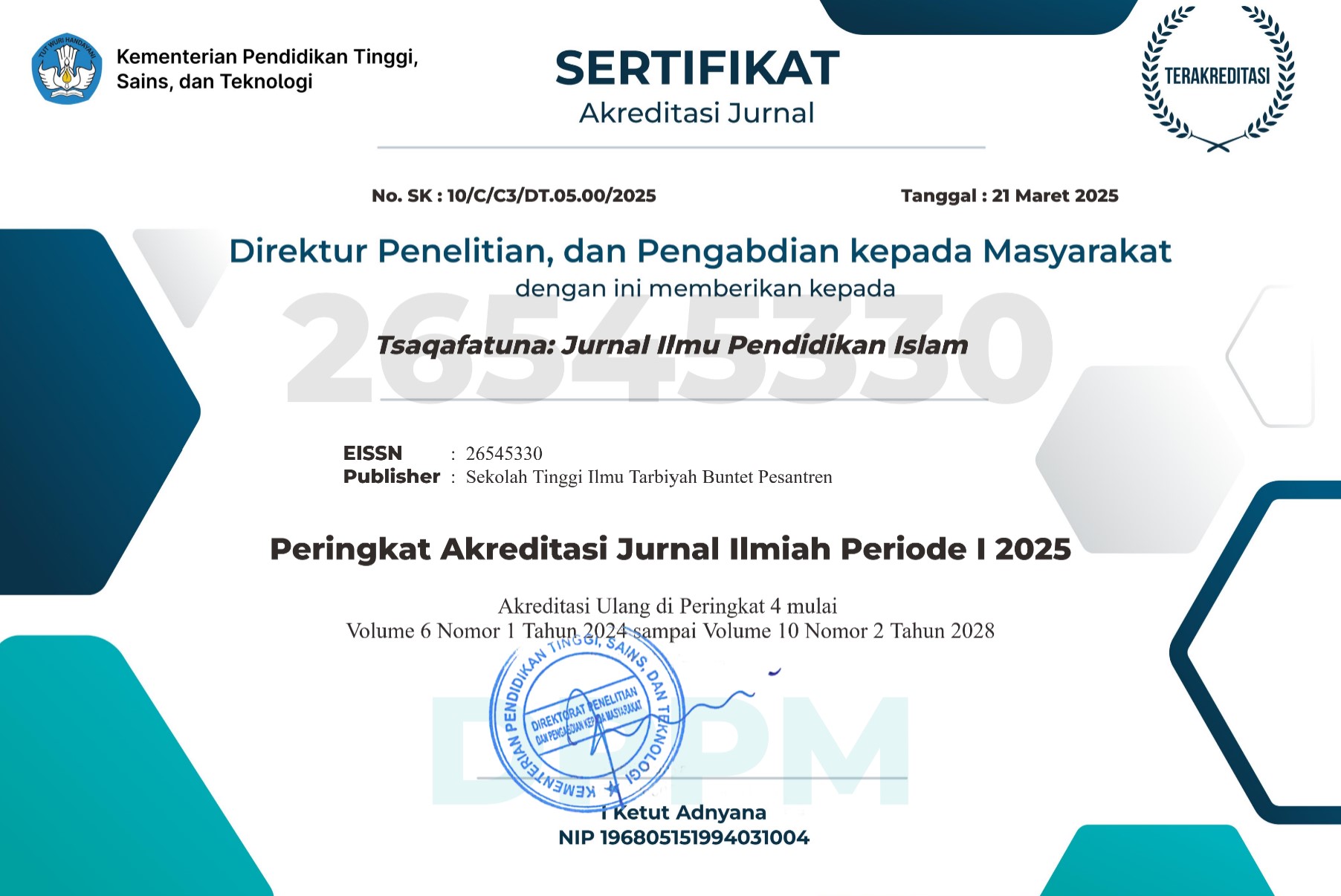Moderasi Beragama untuk Mendeteksi Dini Radikalisme di Dunia Pendidikan:
Sebuah Sintesis Konseptual
DOI:
https://doi.org/10.54213/tsaqafatuna.v7i2.632Keywords:
religious moderation, radicalism, conceptual synthesis, educationAbstract
Religious moderation (wasathiyyah) is increasingly promoted as a counter-narrative to radicalism in pluralistic societies, yet its potential as a theoretical foundation for early detection frameworks in education remains underexplored. This study adopts a conceptual synthesis approach to integrate insights from religious studies, education, and counter-radicalization literature to theorize how moderation values can inform and enhance anticipatory models of radicalization in schools and universities. Through purposive literature selection and thematic coding, four interrelated themes were identified: (1) the foundational values of religious moderation, (2) early indicators of radicalization, (3) the design of moderation-informed detection instruments, and (4) the role of educational institutions as cultivators and detectors of ideological orientation. Visual models were developed to map the conceptual relationships between moderation values, radical indicators, measurement strategies, and institutional mechanisms. The findings suggest that moderation principles such as tawassuth, tasamuh, and i’tidal can be operationalized not only as preventive ethics but also as analytical tools for interpreting ideological shifts before they manifest behaviorally. This study advances a value-sensitive and education-centered framework for early detection, offering a culturally grounded alternative to securitized models. It concludes by recommending future empirical research to validate and adapt the proposed framework in diverse educational contexts, particularly within Muslim-majority settings.
Downloads
References
Afwadzi, B., Sumbulah, U., Ali, N., & Qudsy, S. Z. (2024). Religious moderation of Islamic university students in Indonesia: Reception of religious texts. HTS Teologiese Studies/Theological Studies, 80(1). https://doi.org/10.4102/hts.v80i1.9369
Arif, K. M. (2021). Concept and implementation of religious moderation in Indonesia. Al-Risalah: Jurnal Studi Agama Dan Pemikiran Islam, 12(1), 90–106. https://doi.org/10.34005/alrisalah.v12i1.1212
Arifinsyah, A., Andy, S., & Damanik, A. (2020). The urgency of religious moderation in preventing radicalism in Indonesia. ESENSIA: Jurnal Ilmu-Ilmu Ushuluddin, 21(1), 91–108. https://doi.org/10.14421/esensia.v21i1.2199
Daheri, M. (2022). Religious Moderation, Inclusive, and Global Citizenship as New Directions for Islamic Religious Education in Madrasah. Nazhruna: Jurnal Pendidikan Islam, 5(1), 64–77. http://dx.doi.org/10.31538/nzh.v5i1.1853
Hanafi, Y., Saefi, M., Diyana, T. N., Ikhsan, M. A., Faizin, N., Thoriquttyas, T., & Murtadho, N. (2022). Students’ perspectives on religious moderation: A qualitative study into religious literacy processes. HTS Teologiese Studies/Theological Studies, 78(1). https://doi.org/10.4102/hts.v78i1.7638
Hariri, W. M., & Wardiyah, M. L. (2023). Radicalism Early Detection and Driving Factors: A Mix Method Study on Islamic University Students in West Java. JCIC: Jurnal CIC Lembaga Riset Dan Konsultan Sosial, 5(2), 87–100. https://doi.org/10.51486/jbo.v5i1.211
Kemenag, R. I. B. (2019). Buku saku moderasi beragama. Jakarta: Kemenag RI. https://shorturl.at/vDddK
Khalil, J. (2014). Radical Beliefs and Violent Actions Are Not Synonymous: How to Place the Key Disjuncture Between Attitudes and Behaviors at the Heart of Our Research into Political Violence. Studies in Conflict & Terrorism, 37(2), 198–211. https://doi.org/10.1080/1057610X.2014.862902
Khasanah, N., Hamzani, A. I., & Aravik, H. (2023). Religious moderation in the Islamic education system in Indonesia. Qalamuna: Jurnal Pendidikan, Sosial, Dan Agama, 15(1), 629–642. https://doi.org/10.37680/qalamuna.v15i1.4115
Krismono, K. (2017). Salafisme Di Indonesia: Ideologi, Politik Negara, Dan Fragmentasi. Millah: Journal of Religious Studies, 173–202. https://doi.org/10.20885/millah.vol16.iss2.art2
Kursuncu, U., Gaur, M., Castillo, C., Alambo, A., Thirunarayan, K., Shalin, V., Achilov, D., Arpinar, I. B., & Sheth, A. (2019). Modeling islamist extremist communications on social media using contextual dimensions: religion, ideology, and hate. Proceedings of the ACM on Human-Computer Interaction, 3(CSCW), 1–22. https://doi.org/10.48550/arXiv.1908.06520
Mala, A., & Hunaida, W. L. (2023). Exploring the role of religious moderation in Islamic education: A comprehensive analysis of its unifying potential and practical applications. Jurnal Pendidikan Agama Islam (Journal of Islamic Education Studies), 11(2), 173–196. https://doi.org/10.15642/jpai.2023.11.2.173-196
Păduraru, M. (2021). Theoretical and Practical Approach for Risk and Early Warning Systems using Bayes Rule. Public Sector Opportunities in Times of Crises, 47. https://shorturl.at/ceTro
Ramadhan, R. A., Arqam, N. F. R., & Muhyi, A. A. (2024). The Concept of Religious Moderation: A Study of Maudhu’i’s Interpretation. Bull. Islam. Res, 2(3), 399–412. https://doi.org/10.69526/bir.v2i3.53
Ro’uf, A., Samsudi, S., & Elmubarok, Z. (2022). The Characteristics of Standard Instruments for Early Detection of Terrorism in the Name of Jihad in High School Students. Journal of Research and Educational Research Evaluation, 11(1), 23–34. http://dx.doi.org/10.15294/jere.v11i1.55419
Rothman, J., Damron-Rodriguez, J., & Shenassa, E. (2013). Systematic Research Synthesis–Conceptual Integration Methods of Meta-Analysis. In Intervention research (pp. 133–160). Routledge. https://shorturl.at/3mKlY
Setyawan, M. A. (2024). Early detection scale of radicalism in pesantren. Nathiqiyyah, 7(2), 160–170. https://doi.org/10.46781/nathiqiyyah.v7i2.1192
Shihab, M. Q. (2019). Wasathiyyah Wawasan Islam tentang Moderasi Beragama. Lentera Hati Group.
Snyder, H. (2019). Literature review as a research methodology: An overview and guidelines. Journal of Business Research, 104, 333–339. https://doi.org/10.1016/j.jbusres.2019.07.039
Syarif, S. (2021). Understanding the teaching of religious moderation from a sufistic perspective and its implications for student performance. Journal of Social Studies Education Research, 12(4), 320–343. https://www.learntechlib.org/p/220446/
Van de Weert, A., & Eijkman, Q. A. M. (2019). Subjectivity in detection of radicalisation and violent extremism: a youth worker’s perspective. Behavioral Sciences of Terrorism and Political Aggression, 11(3), 191–214. https://doi.org/10.1080/19434472.2018.1457069
Wahid, A., & Borum, R. (2018). Fundamentalisme dan Radikalisme Islam (Telaah Kritis tentang Eksistensinya Masa Kini). Journal of Strategic Security, 4(4), 7–36. https://doi.org/10.24252/sulesana.v12i1.5669
Wardi, M., Alias, N. A., Hidayat, T., & Hali, A. U. (2023). Implementation of Education Based on Religious Moderation. Tafkir: Interdisciplinary Journal of Islamic Education, 4(1), 163–179. https://doi.org/10.31538/tijie.v4i1.313
Widyaningsih, R. (2019). Local Wisdom Approach to Develop Counter-Radicalization Strategy. IOP Conference Series: Earth and Environmental Science, 255(1), 12049. https://doi.org/10.1088/1755-1315/255/1/012049
Zada, A. (2018). Religious extremism and girls’ right to education in Pakistan: history, development, and prospects: the case of the SWAT valley. http://hdl.handle.net/11250/2502007











